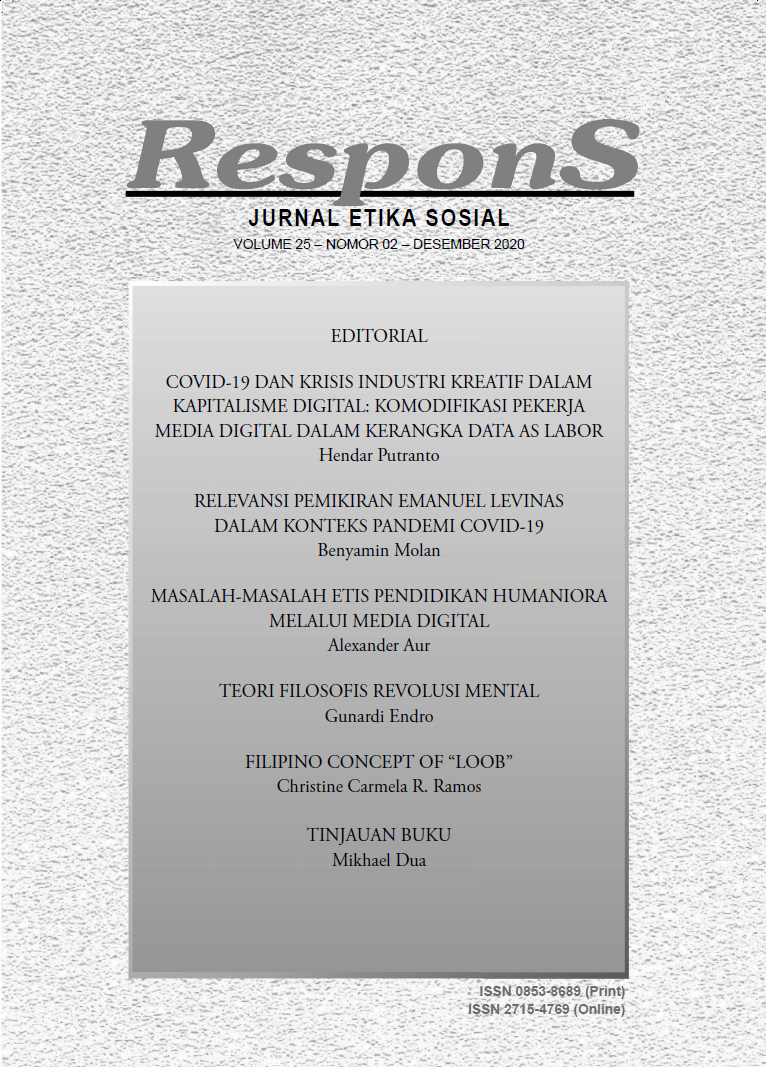The Relevance of Emmanuel Levinas' Thought in the Context of the Covid-19 Pandemic
DOI:
https://doi.org/10.25170/respons.v25i02.2464Keywords:
Covid-19, responsibility, other face, third party, totality, infinity, ethicsAbstract
Covid-19 as a pandemic has deeply troubled in human life. All countries around the world have been trying hard to stem the spread of this virus. Gradually, people began to realize that all efforts to prevent the spread of this virus could not be handled individually. Measures and policies such as staying at home, wearing masks, washing hands, maintaining distance (physical distancing), avoiding crowds (social distancing), are not just for the sake of saving oneself but especially for the safety of others. It is plausible that in the discourse on responsibility towards others, Levinas' thought is presented. "The encounter with other faces and third persons" has become a central theme of his philosophy and ethics. For Levinas the basic fact in his philosophy is not awareness of myself but awareness of others and mankind. Covid-19 deserves to be a momentum to reflect on the philosophy of Levinas, by reaffirming responsibility towards others.
References
Bertens K. 2014. Sejarah Filsafat Kontemporer : Prancis (Jilid II). Jakarta: Gramedia.
Critchley, Simon and Bernascono, Robert (eds). 2004. The Cambridge Companion to Levinas. Cambridge: Cambridge University Press.
Hidya Tjaya, Thomas. 2015. Enigma Wajah Orang Lain: Menggali Pemikiran Emmanuel Levinas. KPG. Jakarta.
Levinas, Emmanuel. 1979. Totality and Infinity: An Essay on Exteriority, translated by Alphonso Lingis.
Levinas Emmanuel. 1985. Ethics and Infinity. Trans. Richard A. Cohen. Pittsburgh: Duquesne University Press.
Levinas, Emmanuel. 1981. Otherwise than Being or Beyond Essence. Trans. Alphonso Lingis. The Hague: Martinus Nijhoff.
Magnis-Suseno, Franz. 2000. 12 Tokoh Etika Abad ke-20. Yogyakarta: Kanisius.
Marcus, Paul. 2008. Being For The Other: Emmanuel Levinas, Ethical Living and Psychoanalysis. Milwaukee, Wisconsin: Marquette University Press.
Rogers, Nigel. Mel Thompson.2011. Existensialism Made Easy. London: Hodder Education. Terj. Benyamin Molan. 2015. Cara Mudah Mempelajari Eksistensialisme. Jakarta: Indeks
Simmons, William Paul:. 1996. An-Archy and Justice: An Introduction to Emmanuel Levinas 's Political Thought. Lousiana State University.
Sean Hand. 2009. Emmanuel Levinas. New York. Routledge.
Vernon, Mark. 2012. Explore Humanism. London: Hodder Education. Terj. Benyamin Molan. 2015. Mengeksplorasi Humanisme. Jakarta: Indeks.








